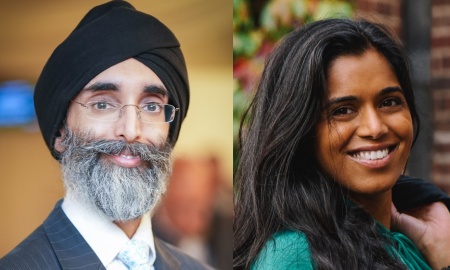Sign up for our free daily newsletter
YOUR PRIVACY - PLEASE READ CAREFULLY DATA PROTECTION STATEMENT
Below we explain how we will communicate with you. We set out how we use your data in our Privacy Policy.
Global City Media, and its associated brands will use the lawful basis of legitimate interests to use
the
contact details you have supplied to contact you regarding our publications, events, training,
reader
research, and other relevant information. We will always give you the option to opt out of our
marketing.
By clicking submit, you confirm that you understand and accept the Terms & Conditions and Privacy Policy
The launch of this year's South Asian Heritage Month (SAHM) has been welcomed by legal professionals, including the Law Society of England & Wales president, Nick Emmerson.
The launch of this year's event on 18 July came just a few days after Shabana Mahmood KC MP, who has Kashmiri heritage, was sworn in as the UK's first woman Muslim lord chancellor.
This year's SAHM has the theme "Free To Be Me". Family barrister Jasvir Singh Degun CBE of Lamb Building, a co-founder of the event, said the theme resonated deeply with him.
“As an openly gay Sikh man who wears a turban, the Bar has perhaps been the only place where I have felt entirely at ease with who I am from the outset and where what makes me stand out has been celebrated," he said.
“I am also aware that not everyone feels able to be themselves. I truly hope that the theme allows people to discuss the barriers they face regarding their intersectional identities,” Degun added.
One immediate contribution was the foundation of the South Asian Litigators Forum by Marsh senior vice president of litigation funding, Sanjay Desai, and Grant Thornton insolvency partner Prashan Patel.
Desai said their aim was to build a community of those involved in the disputes arena from a South Asian background for shared experiences and mutual support, as well as to develop a collective voice and encourage greater representation at senior levels.
Byfield account director Ammaarah Hafezi said lawyers should use the month to explore the theme, whether holding conversations about ways to bring systematic change for nurturing talent, increasing retention or improving the diversity of the talent pipeline.
“South Asia is a large region and I look forward to seeing its diversity reflected in the events and conversations held throughout the month and beyond,” she said.
Previous SAHMs have celebrated those who paved the way for greater diversity and educated others about the role played by South Asians in historical instances of law reform. Lubna Shuja, the first solicitor of Asian heritage to lead the Law Society and its immediate past president, championed those contributions during her term of office, which coincided with experienced regulator Amerdeep Sohal becoming the first Muslim to be appointed as chair of the Society's board.
Shuja’s successor, Nick Emmerson, said: “South Asian Heritage Month is important as it raises awareness of the richness of South Asia’s history and culture. It also recognises the diverse experiences and valuable contributions of South Asian communities in this country."
Emmerson added that collaboration on such events would help create a more diverse profession, helping the collective effort needed to improve racial equity and inclusion across the legal sector and broader society.
The need for collaboration was underlined by research published by BCLP and networking organisation Diverse Talent Networks at the start of this year's SAHM, which found that South Asian partners were underrepresented by 50% in large law firms despite good representation at entry to the profession.
Nearly half of the partners of South Asian heritage interviewed for the report believed their ethnicity had negatively impacted the speed of their promotion to partner level, while more than one third said it had negatively impacted decisions around work allocation.
They also reported many instances of discrimination, from microaggressions for close to two thirds of respondents, to cronyism, use of racial slurs and moving of goal posts on promotions and career opportunities.
The report suggested measures for law firms to counteract discrimination, including creating networking, mentoring and sponsorship by a senior figure from the majority group to offer advocacy and support, as well as encouraging a 'speak-up' culture among more junior employees. It also suggested challenging alcohol-based networking and socialising – a potentially significant barrier for a group where 88% identify with a religious affiliation that precludes the consumption of alcohol.
Email your news and story ideas to: [email protected]



1.jpg)


